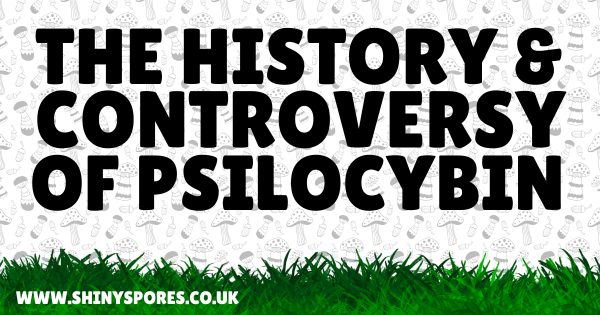The History and Controversy of Psilocybin

Psilocybin, a naturally occurring psychedelic compound found in certain mushroom species, has a rich and intricate history intertwined with both ancient cultural practices and modern legal frameworks. In the UK, its journey from revered substance to criminalised drug reflects broader societal attitudes towards psychedelics.
Ancient Use of Psilocybin
The use of psilocybin mushrooms dates back thousands of years, particularly in Mesoamerica where indigenous cultures, such as the Aztecs and the Mazatecs, incorporated these mushrooms into their rituals. Known as “teonanácatl,” translated as “divine mushroom,” they believed psilocybin facilitated a connection to the divine, promoted healing, and induced visionary experiences. While these ancient practices are primarily documented in regions outside the UK, they highlight a long-standing human fascination with the mind-altering properties of psilocybin.
The Rise of Psychedelic Research in the 20th Century
Interest in psilocybin resurfaced in the mid-20th century as researchers began studying its psychological effects. In the 1950s and 1960s, scientists in the UK, alongside their counterparts in the US, explored the therapeutic potential of psilocybin, suggesting it could offer profound benefits for mental health conditions. However, the burgeoning interest coincided with an increase in recreational use, leading to a societal backlash and heightened scrutiny from authorities.
The Criminalisation of Psilocybin in the UK
In 1971, the Misuse of Drugs Act was enacted in the UK, classifying psilocybin as a Class A substance. This classification indicated a high potential for abuse and no recognised medical benefits, effectively prohibiting its use. The criminalisation was largely influenced by the association of psychedelics with the counterculture movement of the 1960s and a widespread fear surrounding drug abuse.
Following this, the UK’s approach to psilocybin and other psychedelics became increasingly conservative. The stigma surrounding these substances restricted research opportunities and limited public understanding of their potential benefits.
A Renewed Interest in Psilocybin
In recent years, a resurgence of interest has emerged surrounding psilocybin and its potential therapeutic applications. Growing evidence suggests that psilocybin may be effective in treating conditions such as depression, anxiety, PTSD, and addiction. Several UK universities and research institutions have initiated studies that explore the efficacy of psilocybin in clinical settings, with promising results indicating significant psychological improvement in participants.
This modern wave of research has ignited discussions about the re-evaluation of psilocybin’s legal status. Campaigners are advocating for a reconsideration of current regulations, arguing that the potential benefits of psilocybin in mental health treatment warrant a shift in policy. Some policymakers and health professionals are beginning to recognise that the stigma of the past may need to be addressed in light of new evidence.
Continuing Controversies and Challenges
Despite the growing body of research supporting the benefits of psilocybin, controversy remains. Critics express concerns about the risks of misuse and the potential for negative psychological effects stemming from unsupervised use. Questions about the long-term impacts of psilocybin on mental health and the dangers associated with uncontrolled environments for its use continue to fuel debate.
Moreover, while there is momentum for change, the regulatory landscape remains complex. Any potential reclassification or legalisation would require a robust framework to ensure safe use and access, posing significant challenges for researchers and advocates alike.
Conclusion
The history of psilocybin in the UK illustrates a broader narrative regarding society’s evolving perceptions of psychedelics. From ancient spiritual practices to modern-day research, psilocybin’s story reflects both the complexities of cultural attitudes and the barriers created by legislation.
As research continues to reveal the therapeutic potential of psilocybin, a thoughtful and balanced discussion surrounding its legal status is essential. The ongoing exploration of psilocybin as both a therapeutic agent and a subject of controversy will undoubtedly shape its role in future mental health treatment and drug policy in the UK. As we move forward, fostering informed discourse and evidence-based approaches will be key to understanding the place of psilocybin in contemporary society.









